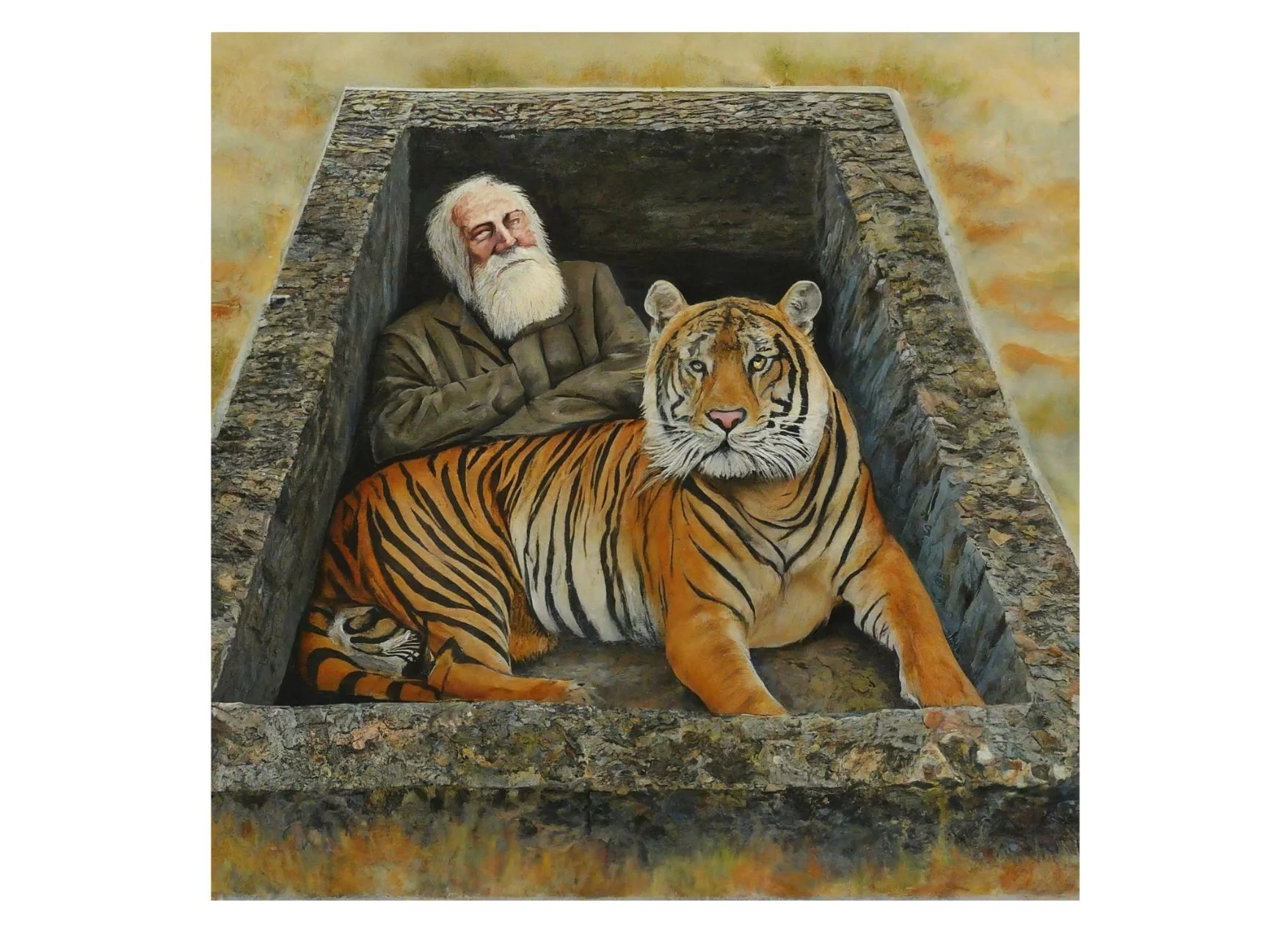Dead Philosopher Hypothesizes the Reason the Malayan Tiger Is Critically Endangered Is Because Malaysians are Envious of It
Image: AI generated via Canva
An unprecedented study from a long-deceased Western thinker breaks from routine Malaysian excuses to suggest the unexplored psychological angle of possessing a superiority complex can be linked to the near-extinction of the majestic species native to the small country.
The Malayan tiger gained an unexpected advocate last week in the form of a corpse buried more than 70 years ago. The remains of Hans Wolfgang Wolfman emerged briefly from a grave in the English countryside to offer a much-needed intellectual take on the worsening issue that has produced wide-ranging reactions of mystification and indifference among Malaysians.
After years of failed campaigns to protect their national animal, questions have arisen about the sincerity of those efforts, which have been the purview of the government, members of the elites, and various organizations.
“One wonders if there is an element of resentment involved,” Wolfman is quoted as saying by a passerby cycling past.
“If one erroneously chooses to compare oneself with a tiger and use its likeness on emblems but shows a brazen disregard for protecting the animal that they have long been aware is at risk of deletion, is it merely exploitation of an exceptional creature whose admirable qualities one covets and cannot live up to? Is it a result of the existential dread suffered by those who lack a sense of self and so leech onto the strong, established identities of others to overcompensate, nay, to borrow or steal recognized identities, while simultaneously enabling the destruction of those such unmatched superior beings they secretly regard as competition?
Perhaps we can reduce the problem to sheer incompetence, and I suppose the Dunning Kruger thing, though it still brings us to the question of envy — the sense of failure those who are plagued with feelings of inferiority, which they will deny, when comparing themselves to those who are more impressive. It is a question of self-esteem.”
The Malayan tiger population in Malaysia was estimated to be at 3,000 in the 1950s. Currently, the number is believed to be under 150, the drastic decline corresponding with overdevelopment in the Southeast Asian country. Official reasons given by experts and government leaders for the continuous elimination include deforestation, habitat encroachment, unprotected prey such as the sambar deer, trophy hunting, poaching, and traditional medicine.
Despite such acknowledgments of rampant criminal exploits for years and specific laws to protect wildlife, no individuals involved in illegal activity, aside from wildlife trafficking bigwig Teo Boon Ching, who Thailand apprehended in 2022 and the US sentenced to 18 months in prison, have been arrested or prosecuted.
“We are monitoring all of them,” a senior cop at Bukit Aman wrote judiciously in a Whatsapp response. “Hopefully, the lawbreakers will appreciate our patience as we continue to observe all their offenses and do absolutely nothing to stop them. Be kind and accommodating, and one day, they will realize on their own that they should stop being criminals. Or foreign authorities will do the actual work of catching them, because they don’t have to consider things like unity and inclusion, bribe-giving, or if there are titles involved, which makes life easier for us.”
Calls to Perhilitan, the Department of Wildlife and National Parks, went directly to voicemail with a message explaining that officers were busy shooting dead any crocodiles who dared roam around their habitat in Lahad Datu, Sabah, where crocodiles are a protected species. “So we’ll get back to you,” the voice recording of an overweight female sneered, “once we get them on the endangered species list.”
Wolfman continued thoughtfully, “It makes sense to envy a tiger. The tiger is a magnificent, powerful, courageous apex predator. It is not a pack animal but quite solitary, so we know it is not insecure. There are many advantages to being a tiger that would naturally make insecure people — the super-predators of the world who have destroyed everything there is to destroy — bitter.
Frankly, this dilemma might just be an example of poor coping mechanisms for those in search of an identity, who rely on different personas to make up for an absence of self. I must say, these circumstances have thus paved the way for the tiger’s downfall. If the inferior person’s need to feel dominant and significant comes at the expense of those who are superior, then the Malayan tiger had no chance.
Alas, envy, that which is considered one of the worst of the deadly sins, is rarely confessed.”
Local cobbler Din Mat Nor was among the few Malaysians in solidarity with the Malayan tiger.
“I used to be a supporter of Harimau Malaya,” Din said as he squatted by the five-foot way in Damansara Uptown where he conducted business daily. He took a drag of his Dunhill Classic Red cigarette and thought for a moment. “But the team is a bit shit. A team of actual tigers would be number 1 in the world. Not number 133. Thought it was a disgrace to tigers. Better to rename the team to a mythical creature. Just make one up.”
Harimau Malaya logo + excerpt: harimaumalaya.com.my
“I think it can help to hear the perspective of an outsider,” DBKL cleaner Anupama shrugged when asked what she thought about Wolfman’s observations. “Might as well have a dead guy step up if the living are comatose.”
Wolfman’s theory is the most recent European examination of the former British colony with past colonial views of locals being “sluggish” and “lazy” having been roundly rejected by academics in the country.



